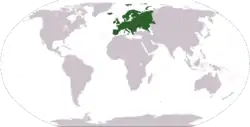ヨーロッパ
Japanese

Alternative forms
Etymology
/europpa/ [jeuɺoppa] → /joːroppa/
From Portuguese Europa.[1][2][3][4][5]
Some references[3] source this from Dutch Europa; however, Dutch phonology makes this less likely, as the ⟨eu⟩ vowel combination has apparently been pronounced as the monophthongs /œː/ or /øː/ since the time of Middle Dutch. Meanwhile, in Portuguese, the ⟨eu⟩ vowel combination has been pronounced as the diphthong /ew/, a closer match for the borrowed Japanese pronunciation.
Although this term is a 外来語 (gairaigo, “word of non-native or non-Middle Chinese origin”), it was borrowed early enough to be subject to the sound change from /eu/ to /joː/ during Late Middle Japanese. Compare similar developments in English (/eu/ → /juː/; /jʊ/, /jɔː/, /jɜː/ before /r/) during the Great Vowel Shift, which yields the modern English pronunciation of Europe.
References
- 1988, 国語大辞典(新装版) (Kokugo Dai Jiten, Revised Edition) (in Japanese), Tōkyō: Shogakukan
- 1995, 大辞泉 (Daijisen) (in Japanese), Tōkyō: Shogakukan, →ISBN
- 1998, 広辞苑 (Kōjien), Fifth Edition (in Japanese), Tōkyō: Iwanami Shoten, →ISBN
- 2006, 大辞林 (Daijirin), Third Edition (in Japanese), Tōkyō: Sanseidō, →ISBN
- 1998, NHK日本語発音アクセント辞典 (NHK Japanese Pronunciation Accent Dictionary) (in Japanese), Tōkyō: NHK, →ISBN
- 1997, 新明解国語辞典 (Shin Meikai Kokugo Jiten), Fifth Edition (in Japanese), Tōkyō: Sanseidō, →ISBN